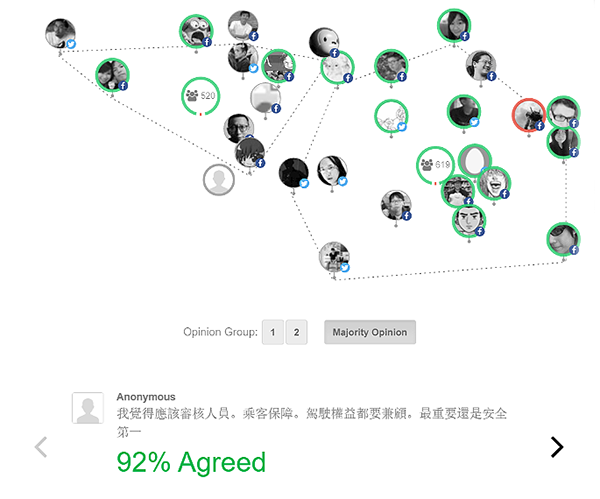vTaiwan: A case study in scaling coordination
by emmi and frank
Note: This short essay is part of the Series by emmi and Frank entitled, “Adapting to Transcend Networked Conflict: How complexity is our biggest asset” which can be found in full here.
Probably the most important question a society faces is how to enable collective action at scale. The complex tapestry of norms, ethics, religions, institutions, beliefs and assumptions that underpin societies across the world exist to a great degree to enable particular kinds of collective action. The explosion of productive capacity and knowledge that has defined the last two centuries resulted from both institutional changes and normative changes.
This means that differences in how we make decisions can have massive knock-on effects. The industrial revolution, after all, was not some one-and-done instance of economic growth. Rather, it was driven by roughly 2% year-on-year growth that compounded upon itself over the course of decades. What was a comparative backwater (the British isles) ended up having a dramatically outsized role relative to its size over the next two centuries because it was the first country to industrialize.
These questions are especially worth considering since the proliferation and democratization of computers. Information technology obviously enables new forms of collective action that previously would have been impossible. We see this with the success of projects like Wikipedia or Linux – which prove that commons-based peer production is superior (in some domains) to the traditional dichotomy of market and state. These are the most successful examples of new forms of collective action enabled by information technology and have been well-documented by scholars.
As an idea, electronically-augmented democracy goes back decades. Electronic democracy is exciting because it has the potential to keep the benefits of democratic decision-making that come with engaged debate over issues. It also demands those involved be explicit about their beliefs. As Henry Farrell and Cosma Shalizi write:
“We argue that democracy has unique benefits as a form of collective problem solving in that it potentially allows people with highly diverse perspectives to come together in order to solve problems. Democracy can do this better than either markets and hierarchies, because it brings these diverse perceptions into direct contact with each other, allowing forms of learning that are unlikely either through the price mechanism of markets or the hierarchical arrangements of bureaucracy.”
We don’t believe that democracy is the perfect mechanism for coordinating many individuals in all instances. Nor do we uncritically accept mechanisms that are directly linked to the state. Nevertheless experiments in augmented decision-making at scale are worth considering and learning from despite these flaws. Worker cooperatives and mutual aid under capitalism are restricted by the obvious injustices of the system. However, they still have utility by demonstrating alternative modes of organizing and allowing us to test for flaws or improvements. The same applies to technologically-enhanced democracy.
vTaiwan helps build consensus with greater efficiency and buy-in

As of 2021, vTaiwan is the most ambitious attempt at building e-democracy at scale the world has seen. It is a software platform that is integrated with the Taiwanese lawmakers and allows direct citizen participation in the process of writing laws.
vTaiwan came about after the success of the 2014 Snowflower movement (basically Taiwan’s Occupy Wall Street). As part of the reforms enacted, the government reached out to the g0v community, a Taiwanese grassroots group that looked to improve government accountability through open-source tools. vTaiwan is a technological system built by g0v that allows for greater real-time, direct democracy at scale. As described on its website:
“vTaiwan is an online-offline consultation process which brings together government ministries, elected representatives, scholars, experts, business leaders, civil society organizations, and citizens. The process helps lawmakers implement decisions with a greater degree of legitimacy. It has various touchpoints such as a website (vtaiwan.tw), a combination of meetings and hackathons along with the consultation process. vTaiwan is also an open space, it is a combination of time and space run by participants to work on cases brought in.”
At the core of vTaiwan is a tool called pol.is, a machine-learning and network visualization algorithm that can evaluate real-time feedback from citizens on issues, visually representing them such that the areas of disagreement/agreement are immediately obvious to all involved. The overlap of agreement is especially valuable because it helps people identify possibilities for broad consensus, while frustrating possibilities for trolling.
Technologies like pol.is have the potential to enable societies to deal with a more complex world. By allowing for a wider diversity of opinions to be incorporated into decision-making, collectives can adopt more nuanced perspectives towards problems and concerns. By making consensus easier to build, coordinated action at scale is simpler to achieve because there are fewer dissenters.The less dissent a social network has, the more likely it is to cooperate in other ways.
Moreover, the underlying technology is relatively easy to export. Because it operates off of open-source software, other jurisdictions and groups can easily adopt similar measures to help inform decision-making processes. This means that successful measures can be easily replicated across the world. Rich Barlett – who contributed to the open-source consensus decision making software Loomio – noted that the software allows more participatory government, as well as simplifying the replication of strategies used to force change, once they have been established. As he writes:
In Taiwan …, the credibility of the new political actors is rooted in the streets. Second, those actors have deployed a rigorous political strategy, systematically making allies throughout the public & private sectors, and civil society. The folks from vTaiwan told me how they interviewed every state official they could find and used the results to map out which government departments were almost ready to concede decision-making power to citizens. Then they used those early engagements as leverage, playing departments off each other in a competition for who could be the most participatory. That is the kind of strategic genius that could be repeated the world over.
In practice, vTaiwan has been used to inform several government decisions. For example, it was key to large scale deliberations about the complexities of letting massive companies like Uber allowing rides in the country. Whether you agree with this approach itself, it should be clear how these social and technical processes can be applied to a range of problems currently impeding coordination.
States moving in a more decentralist direction and giving their citizens more autonomy and agency is an exciting development because it could result in genuine alternatives to the hierarchical model that predominates at scale. We should be concerned about the possible failure modes or potential for co-option that this approach may allow and we should push to avoid these problems. Nevertheless, we should cheer on these sorts of developments; both because they give us empirical examples of alternatives to the sort of managerial hierarchies currently ubiquitous in government decision-making, and because – whether they succeed or fail – they represent steps, however small, towards a better world.
[1] The cybernetician Stafford Beer’s booklet Designing Freedom from the 70s includes a section that outlines mechanisms for real-time democratic feedback, for example
[2] Cognitive Democracy, Henry Farrell, Cosma Shalizi
[3] Organizing Beyond Organizations: Good News Stories from Spain and Taiwan, Richard Barlett
